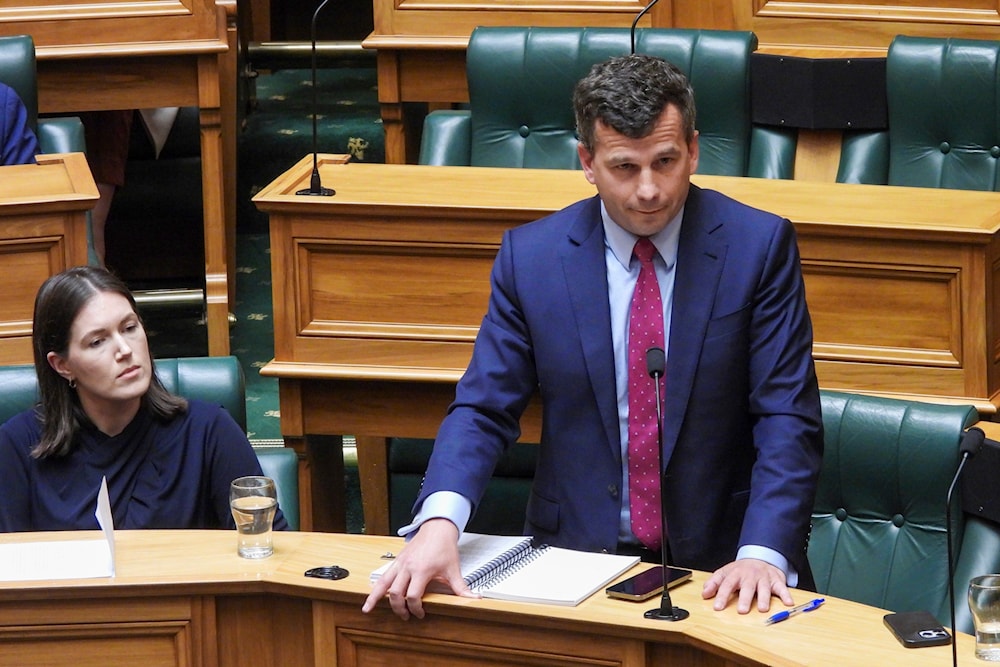New Zealand panel urges scrapping divisive Maori treaty bill
A parliamentary committee in New Zealand recommended scrapping the Principles bill, which seeks to reform the interpretation of New Zealand's founding Treaty of Waitangi, which protects the rights of the Maori.
-

ACT Party leader David Seymour stands during the first debate on the Treaty Principles Bill in Parliament in Wellington, New Zealand, Thursday, November 14, 2024 (AP)
A parliamentary committee in New Zealand recommended scrapping a bill that sought to radically reinterpret the country's founding treaty, signed between the Maori tribes who inhabited the country and the British Crown.
The Justice Select Committee recommended nullifying the treaty principles bill, which was introduced by the minor coalition Act Party and aims to replace long-standing guidelines governing Maori-Crown relations with its own reinterpreted principles.
The bill sparked a record-breaking response, with over 300,000 written submissions flooding in, followed by weeks of intensive hearings that led the Justice Select Committee to deliver its report back to the house on Friday—more than a month ahead of schedule.
The Act Party contended that the Treaty of Waitangi—New Zealand’s founding document, which safeguards Maori rights—has led to principles granting the Māori distinct political and legal privileges not available to non-Māori.
In its report, the committee noted that an overwhelming proportion of submissions rejected the proposed legislation, with critics consistently highlighting three key concerns - the bill's perceived incompatibility with treaty obligations, fundamental shortcomings in its drafting process, and its potential to undermine societal unity.
David Seymour, the Act leader backing the bill, claimed that controversial bills frequently lead to committee submissions that "don’t accurately capture the public’s views."
“Opponents will make much of the balance of submissions, but if they believed the public opposed the bill they could call for a referendum where everyone votes,” he declared after the report was published.
As part of its coalition agreement with Act, National committed to supporting the bill through its first reading and the select committee process, but both National and the third coalition partner, New Zealand First, have indicated they will oppose it at the second reading.
The Treaty of Waitangi
The Treaty of Waitangi, signed in 1840 by the colonial British ruler and 500 Māori chiefs, establishes co-governance principles for Indigenous and non-Indigenous New Zealanders.
It is regarded as one of the country's foundational documents, and the interpretation of its provisions continues to shape legislation and policy today.
The founding treaty was signed in two languages: Māori (Te Tiriti) and English. However, the differences in language have led to debates regarding its definition and interpretation.
Unlike the United States, New Zealand lacks a written constitution, relying on the principles of the Treaty of Waitangi, which aims to protect Māori interests and their relationship with the British Crown, with courts addressing Māori disenfranchisement and social inequities.
The Treaty of Waitangi protects Māori by guaranteeing tino rangatiratanga (full authority) over their lands, resources, and culture (Article 2), ensuring equal rights as British subjects (Article 3), and establishing a partnership with the Crown in governance (Article 1).
Modern enforcement includes the Waitangi Tribunal, which addresses historical breaches, and laws requiring Māori consultation in policy decisions. Additionally, it supports Māori language revitalization and land rights through institutions like the Māori Land Court.

 3 Min Read
3 Min Read










